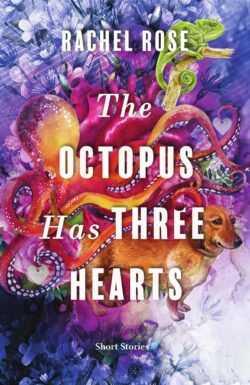1205 Needy people & creature comforts
The Octopus Has Three Hearts
by Rachel Rose
Madeira Park: Douglas & McIntyre, 2021
$22.95 / 9781771622882
Reviewed by Candace Fertile
*
 Rachel Rose’s first collection of short stories, The Octopus Has Three Hearts, is as terrific as readers of her poetry would expect. The 14 stories feature various characters in different kinds of crises, all accompanied by a wide range of animals, from dogs to chickens to sugar gliders, and more. Rose is skilled at exploring and embracing unconventional lives and showing the value of connections among human beings and those between humans and animals in these highly engaging stories. Rose’s characters generally grapple with abuse, often physical and sexual, and how they develop coping strategies is part of what makes Rose’s work so meaningful. Severely damaged characters respond in multiple ways to their distress, sometimes compounding it.
Rachel Rose’s first collection of short stories, The Octopus Has Three Hearts, is as terrific as readers of her poetry would expect. The 14 stories feature various characters in different kinds of crises, all accompanied by a wide range of animals, from dogs to chickens to sugar gliders, and more. Rose is skilled at exploring and embracing unconventional lives and showing the value of connections among human beings and those between humans and animals in these highly engaging stories. Rose’s characters generally grapple with abuse, often physical and sexual, and how they develop coping strategies is part of what makes Rose’s work so meaningful. Severely damaged characters respond in multiple ways to their distress, sometimes compounding it.
The opening story sets the tone of any of the stories. In “Of Rats and Men,” an angry man with a rat asks a woman for a light and then spare change. She has neither. He hits her hard, and it’s only after another woman inquires if she is okay does Piper realize she’s been stabbed. She is seriously harmed and has to have bowel surgery. Not surprisingly Rose cuts to the foolish but understandable essence of Piper’s response: “I was more ashamed to be wearing a colostomy bag than glad I was alive.”When Piper’s twin sister comes to help her, childhood abuse is revealed. But abuse is never past; it inhabits Piper and controls her life to some extent. Part of her survival strategy involves smashing her stabber and stealing his pet rats.

The title story does have an octopus, a 16-footer named Oberon who escapes from his tank at the aquarium. In a panic, Mica calls her husband Phil to come help her find Oberon. She also calls her other husband Winston. Apparently, an octopus does have three hearts, so it’s an appropriate symbol for the family and its polyamorous members. Phil battles jealousy, first of Oberon and then of Winston, and Rose’s resolution is no tidy happily-ever-after but a recognition of the complexity of life and love.
“Troll” is one of the saddest stories (and this book has several that could win that competition). A homeless man named Troy witnesses the “suicide by long-haul truck” of another homeless man. The men live in an encampment of convicted sex offenders. The truck driver thinks Troy is a hero and gives him some money to help with caring for Roxy, the dead man’s dog, that Troy saved from being run over. A Buddhist tells Troy that maybe the dog has saved him, and he explains to Troy that unlike Christianity, Buddhism requires no confession. Rose deftly weaves in the fact that Troy himself was abused by priests. The past is always present.
In “Porco Dio” a couple try to deal with their severely troubled son, but nothing helps. When the boy dies, the family’s potbellied pig won’t leave the body. In “Wings on Pigs” a young, white police officer mistakenly kills a young Black man and takes his puppy. In “Warhol” an African Grey parrot reveals family secrets. The opening sentence of “You’re Home Now” gives a good idea of Rose’s straightforward style and diction: “Earl was always chasing pussy when he was alive, so it was no big surprise when he came back as a wiener dog.” The final story, “White Nose Syndrome” blends environmental disaster with infidelity. Mental health issues affect several characters, and for the most part, Rose uses first person narration to detail their feelings. That’s a valuable way to increase understanding and empathy for those suffering.
Overall, these are tough stories with tough language and an even tougher excavation of how badly some people can behave. The other animals, in contrast to their human companions, offer some light and love in a world of loneliness and pain.
*

Candace Fertile has a PhD in English literature from the University of Alberta. She teaches English at Camosun College in Victoria, writes book reviews for several Canadian publications, and is on the editorial board of Room Magazine. She has reviewed books by Susan Alexander, Katherine Fawcett, Marjorie Celona, Garry Thomas Morse, Nazanine Hozar, Tiziana La Melia, Rita Wong & Fred Wah, Carla Funk, and Jen Currin for The Ormsby Review.
*
The Ormsby Review. More Books. More Reviews. More Often.
Publisher and Editor: Richard Mackie
The Ormsby Review is a journal service for in-depth coverage of B.C. books and authors. The Advisory Board consists of Jean Barman, Wade Davis, Robin Fisher, Cole Harris, Hugh Johnston, Kathy Mezei, Patricia Roy, Maria Tippett, and Graeme Wynn. Scholarly Patron: SFU Graduate Liberal Studies. Honorary Patron: Yosef Wosk. Provincial Government Patron since September 2018: Creative BC
“Only connect.” – E.M. Forster
3 comments on “1205 Needy people & creature comforts”